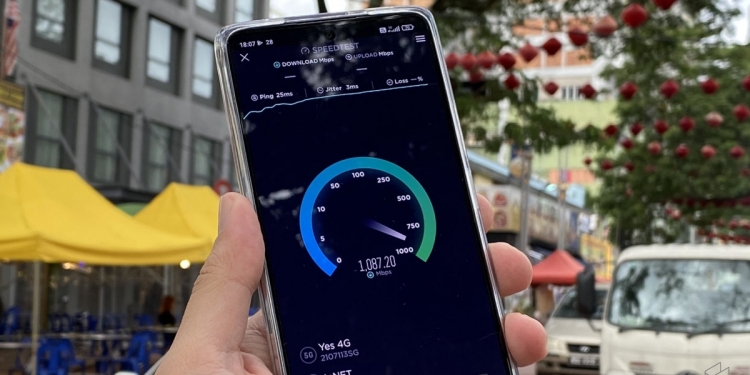The new Mandatory Standards for Quality of Service (MSQoS) is expected to take effect on 1st April 2024 and it requires Malaysian telcos to deliver a minimum download speed of 7.7Mbps. However, the Malaysian Communications and Multimedia Commission (MCMC) has clarified that the MSQoS will not have any impact on existing mobile packages even if their current speed is capped below 7.7Mbps.
Consumer plans below 7.7Mbps are not affected by MSQoS
In a statement issued to The Star, the MCMC said the new standard is aimed at enhancing the overall quality of wireless broadband services with telcos only mandated to deliver a minimum download throughput Quality of Service of 7.7Mbps. It added that consumer plans below 7.7Mbps will not change after 1st April because it is a mandatory standard on Quality of Service, and does not impact product offerings.
The regulator said MSQoS serves as a set of key performance indicators for service providers aimed at monitoring, enforcing and improving the country’s wireless broadband data delivery systems. Each provider is required to submit their network performance reports based on random on-field measurements to simulate user experience. Besides relying on submitted reports from the telcos, the commission also conducts its own on-field measurements at random locations, complaint locations and areas of public interest.
Minimum speed by telcos governed by terms of network performance
The MCMC also said that the minimum speed provided by the service providers is governed by their terms of network performance. It added that the products offered are not regulated because they entail various uses such as personal use, voice calls only, IoT, wearables devices, wireless CCTV, and etc.
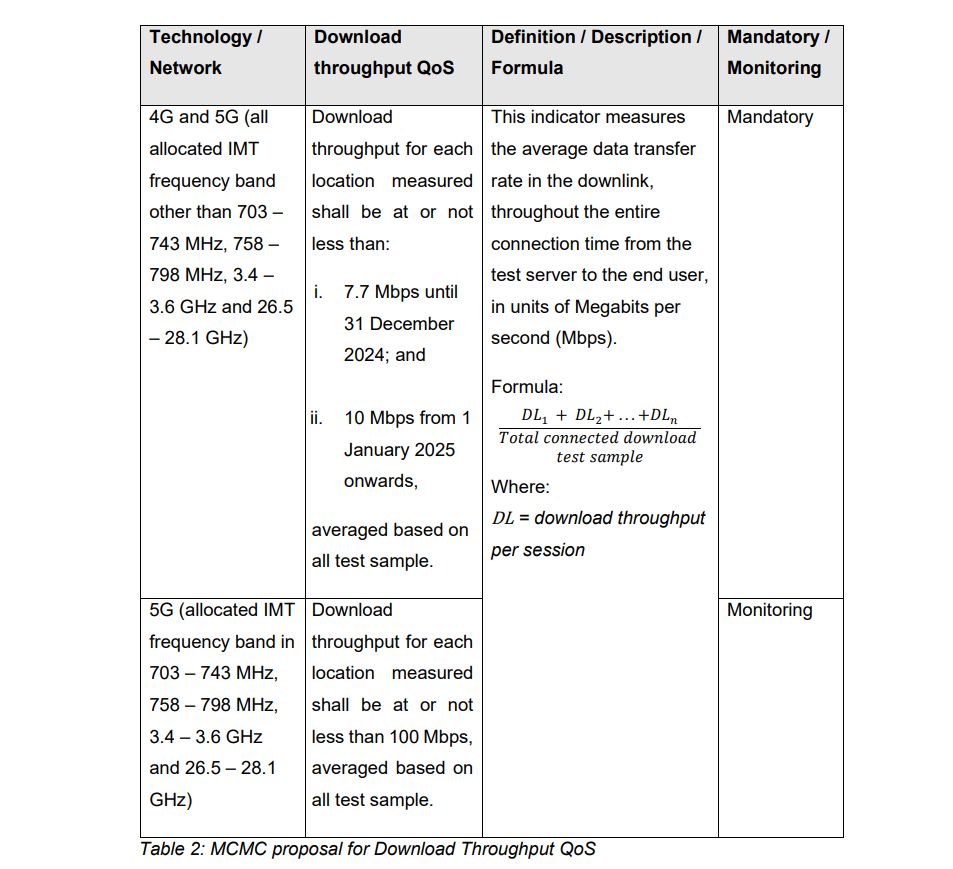
Earlier this month, Deputy Communications Minister Teo Nie Ching told Parliament that service providers are required to ensure average download speeds of at least 7.7Mbps this year and increase to a minimum download speed of 10Mbps from 1st January 2025. As defined by MCMC’s MSQoS document, the indicator measures the average data transfer rate in the downlink throughout the entire connection time from the test service to the end user.
So essentially, each user should be able to get at least 7.7Mbps while doing a speed test which is usually uncapped by the telcos. However, telcos can still impose speed cap restrictions as part of their product offering defined by their terms and conditions.
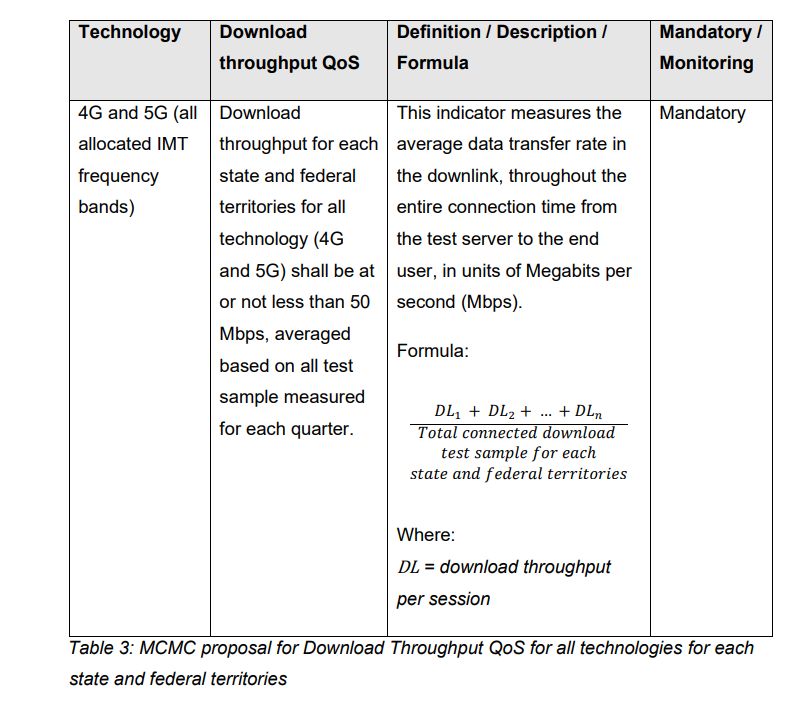
Interestingly, the MSQoS also proposes additional download throughput requirements to be mandated for each state and federal territory to encourage the deployment of 5G networks by service providers. It poses 4G and 5G to have an average of at least 50Mbps measured for each quarter.
Under the current MSQoS introduced in 2021, telcos are only required to deliver at least 2.5Mbps download speeds at 90% of the time, while fixed wireless access is required to deliver a minimum download speed of 25Mbps at 90% of the time.
At the moment, various telcos are offering budget “unlimited plans” with download speed caps as low as 3Mbps. This includes the Pakej Perpaduan plan which offers 30GB of data for RM30 (with 3-month validity) but is limited by a 3Mbps speed cap.
Telcos disagree with proposed 7.7Mbps minimum download in Public Inquiry report
Before implementing the new updated MSQoS, the MCMC released its Public Inquiry Report for the new proposed standards in December 2023. As noted in the report, U Mobile, Redtone, TM and YTL disagreed with the proposed 7.7Mbps minimum download speed and proposed the MCMC to maintain the existing 2.5Mbps download throughout standard for 4G. Meanwhile, CelcomDigi and Maxis proposed 5Mbps as the new minimum, explaining that 5Mbps download speed is sufficient for a good mobile gaming experience and video streaming at 1080p.
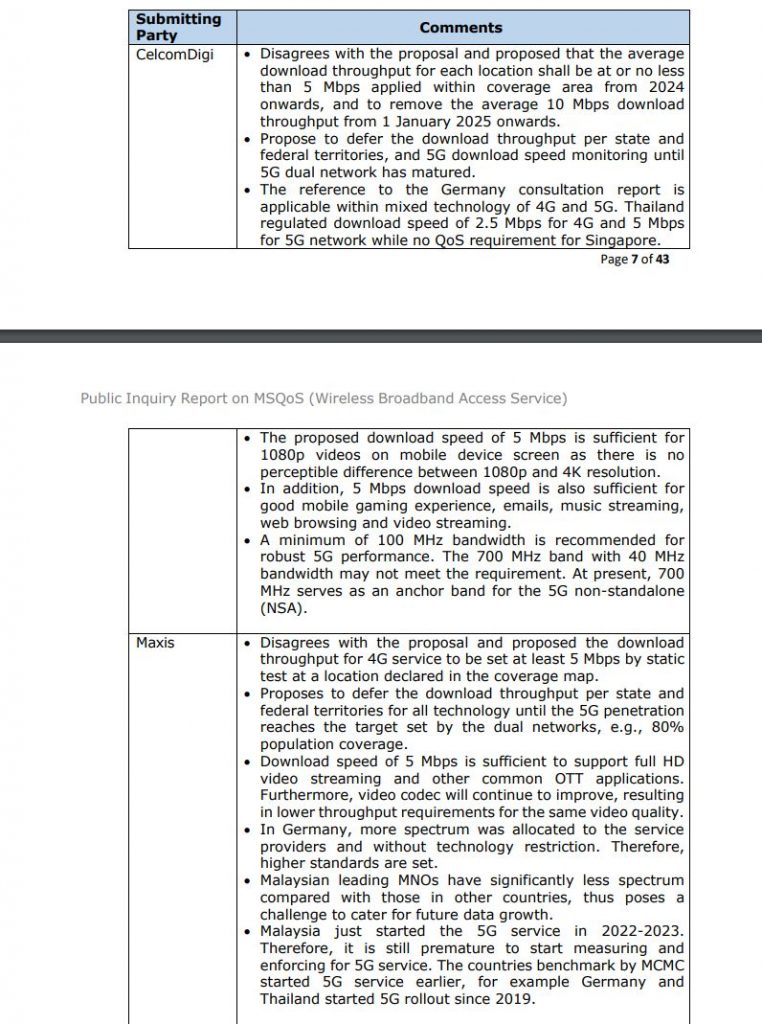
Maxis added that leading MNOs in Malaysia have significantly less spectrum than in other countries which poses a challenge to cater for future growth, while CelcomDigi and U Mobile have also urged the MCMC to deter download throughput requirements per state and federal territories and 5G download speed monitoring until the 5G dual network has matured.
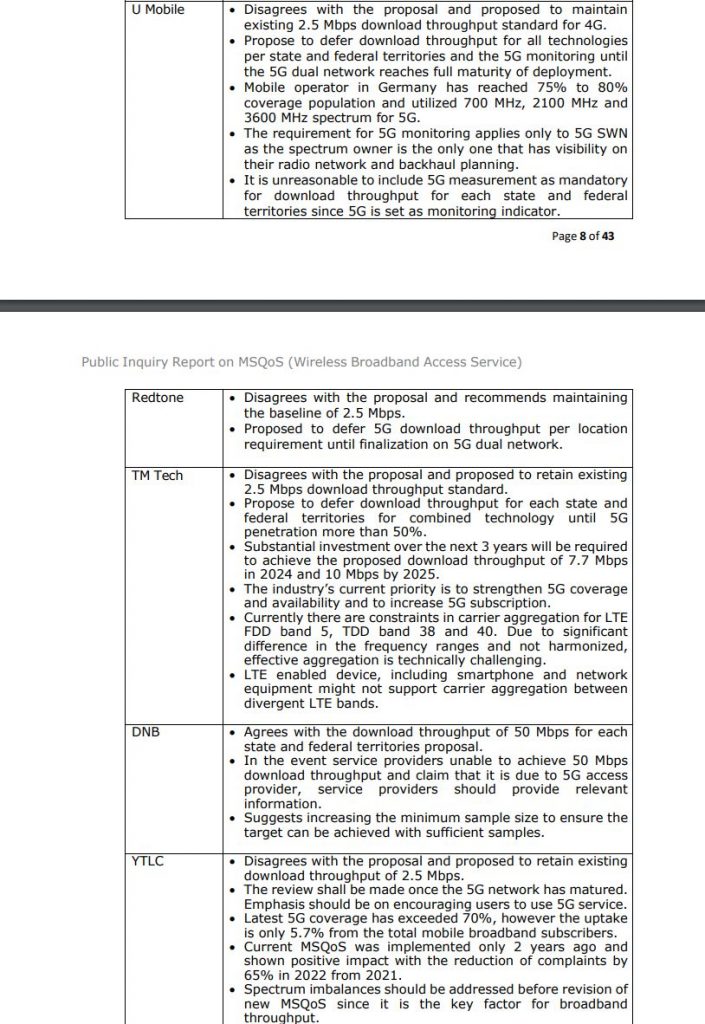
TM also remarked in their response that the industry’s current priority is to strengthen 5G coverage and availability and to increase subscription and there are currently constraints in carrier aggregation for LTE FDD Band 5 and TDD Band 38 and 40. YTL also mentioned that the review shall be made once the 5G network has matured and the emphasis should be on encouraging users to use the 5G service. It also said the spectrum imbalances should be addressed first before the revision of the new MSQoS since it is a key factor for broadband throughput.
DNB on the other hand agrees with MCMC’s proposal to set the download throughput of 50Mbps for each state and federal territories. It said in the event service providers are unable to achieve 50Mbps download throughput and claim that it is due to 5G access provider, they should provide the relevant information. It also suggested the MCMC to increase the minimum sample size to ensure the target can be achieved with sufficient samples.
[ SOURCE ]

